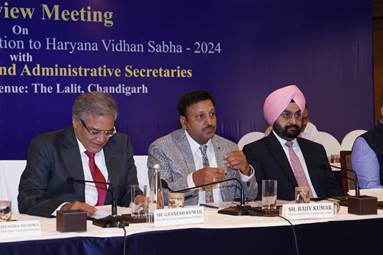
During the two-day review visit of the Commission, representatives of national and state political parties namely Aam Aadmi Party, Bharatiya Janata Party, Communist Party of India (Marxist), Indian National Congress, Indian National Lok Dal and Jannayak Janta Party came to meet the Commission.
The main issues raised by political parties included:
The Commission assured the representatives that it has taken cognizance of suggestions and concerns of the political parties and ECI is committed to conduct free, fair, participative, inclusive, peaceful and inducement free elections in the state. Political parties were encouraged to actively engage in the ongoing second Special Summary Revision process to update the electoral rolls ahead of the elections.
For the first time in State Assembly Elections in Haryana, Senior Citizens over 85+ years and PwDs with 40% benchmark disability will be provided an option to vote from the comfort of their homes. Home Voting facility is optional. If an elector is willing to visit the polling station physically to cast their vote, necessary assistance will be provided at the polling station. Application form 12D is distributed and collected by BLO within 5 days of the notification, from such electors who opt for this facility and deposit it with the Returning Officer. The complete process is videographed and representatives of political parties/candidates are always involved in the entire process of voting from home.
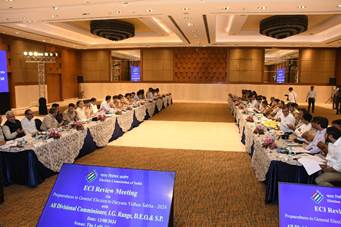
The Commission held detailed review with DEOs/SPs/Divisional Commissioner’s/IGs on every aspect of election planning and conduct including electoral rolls, EVM management, logistics, polling station rationalisation and infrastructure, training of election staff, seizures, law and order, voter awareness and outreach activities.
The Commission also discussed the administrative, logistics, Law & Order and election related arrangements with the Chief Electoral Officer and State Police Nodal Officer. Prior to the detailed review with DEOs & SPs, CEO Haryana gave an overview on all aspects of election management including the ongoing 2nd Special Summary revision of Electoral Rolls in the state with respect to July 1, 2024 as the qualifying date. The final electoral roll will be published on August 27, 2024, a copy of which will be provided to all recognized parties free of cost.
The Commission also held meeting with the Chief Secretary & Director General of Police to review the overall poll preparedness and law and order matters.
CEO, DEOs and SPs made detailed presentation before the Commission. The details are summarised below:
Electors
CEO Haryana informed that as per the draft electoral published on August 2,2024 during the ongoing 2nd SSR in the state, a total of 2.01 crore electors are registered in the state with approx. 1.06 crore male, 0.95 crore female electors. Over 4.52 lakh first time voters (18-19 years); 2.55 lakh 85+ senior citizens and 1.5 lakh PwD voters are registered in the state. More than 10,000 voters are 100+ years old. The final roll will be published on August 27, 2024.
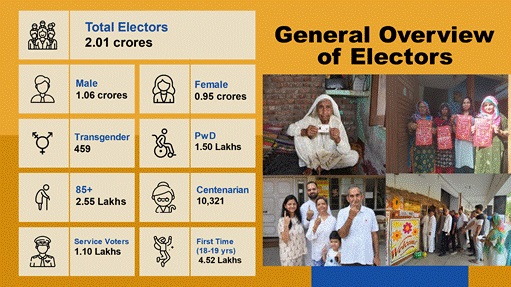
Polling Stations
While giving an overview of the polling stations during the review, CEO Haryana informed that a total of 20,629 polling stations will be set up in assembly elections, which is an increase of 817 Polling stations from Assembly elections in 2019. While 13,497 of these will be in rural areas, 7,132 will be urban polling stations with an average of 977 voters per polling station. 125 PS will be managed solely by women and 116 will be youth managed (young employees) to promote voting amongst the key demographics of women and youth. One polling station in each AC will also be manned by persons with disabilities.
CEO Haryana informed that going beyond ECI’s directions of webcasting in at least 50% polling stations, webcasting to be done in 100% of the polling stations, wherever feasible.
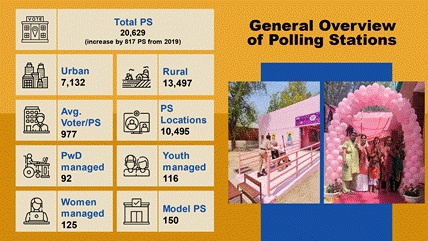
CEO Haryana informed that to facilitate voting in urban areas, districts have identified High Rise societies/covered campuses, and slum clusters for setting up polling stations to facilitate greater participation.
Assured Minimum Facilities at Polling Stations
All DEOs assured that polling stations across the state will have Assured Minimum Facilities like ramps, drinking water, toilets, electricity, shed, chairs etc. for convenience of voters.
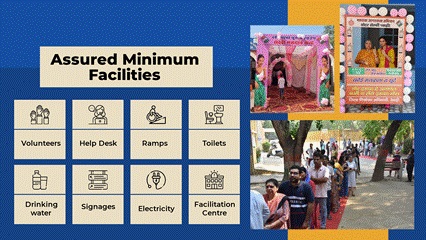
Technology
DEOs informed that they will use an ecosystem of IT Applications to facilitate all stakeholders including voters and political parties.
cVIGIL: This app empowers citizens to report any electoral violations and malpractices. Flying squads are deployed to address the complaints raised through an easy to use, intuitive app which preserves the anonymity of the complainant and assures a response within 100 minutes.
SUVIDHA: It is a single window app for candidates to raise requests for permissions for meeting halls, booking grounds for political rallies etc. The technology is a step towards ensuring a level playing field as permissions are accorded on a first in first out basis, without any discretion.
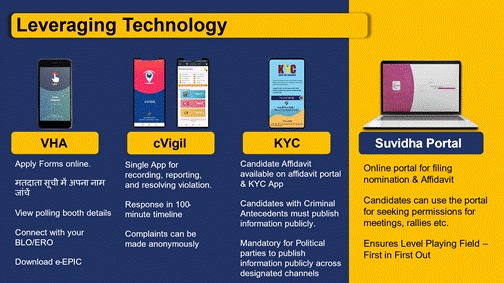
KYC or Know Your Candidate App is a step to promote an informed and aware electorate. The app contains the criminal antecedents, if any, of the candidates in the electoral fray and their assets and liabilities, educational details.
Saksham App is specially designed for PwD voters with various accessibility features built-in. One can request for Pick-n-Drop facility, wheelchair assistance, or volunteer assistance at the polling booth through this app to make the voting experience smooth for PwD voters.
During the review meeting, the Commission gave the following directions to DEOs/SPs for compliance:
On the second day (i.e. August 13, 2024), during the review meeting with nearly 20 central and state Enforcement agencies like DRI, NCB, State & Central GST, RPF, RBI, State Police, Income Tax, Enforcement Directorate, etc., the Commission underscored its focus for an inducement-free elections. Without mincing words, the Commission conveyed its zero tolerance towards use of money power in the elections. The following directions were given to enforcement agencies:
Senior officials from the Commission were also present during the review meetings.